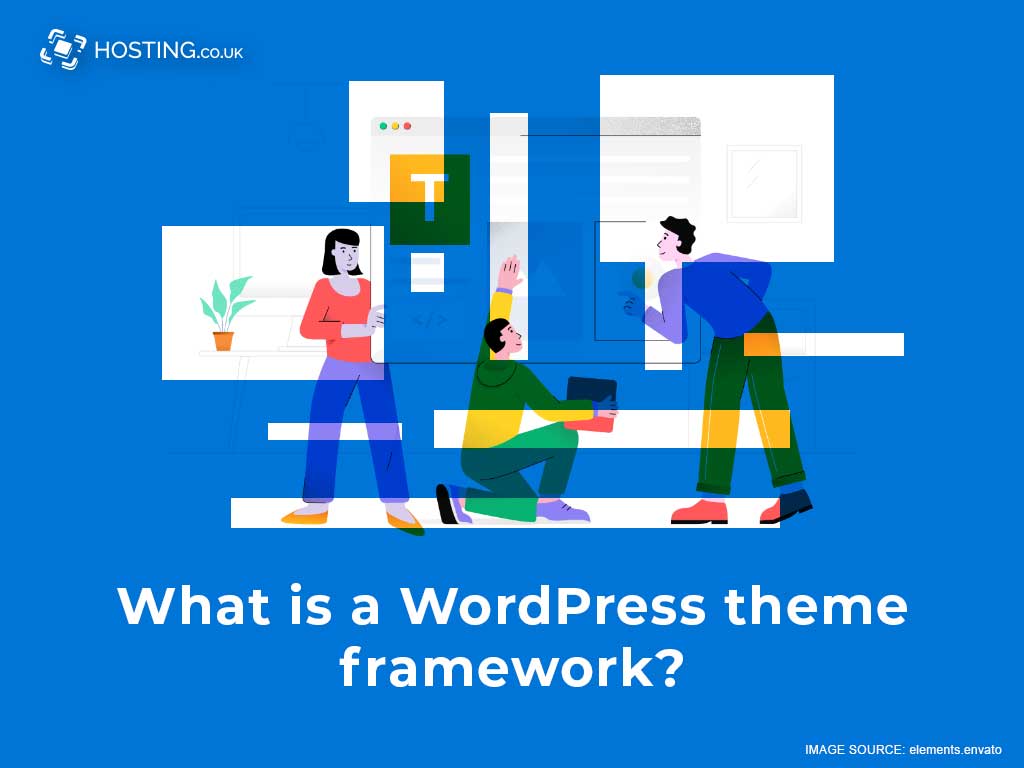If you’ve been looking into WordPress hosting, by now, you must have read at least twenty articles that promised to tell you how to choose the best WordPress theme framework, without ever once telling you what a WordPress theme framework is. By the time you finish reading this article, you’ll know exactly what a WordPress theme framework is. We’ll give you vital information to help you make a better decision about whether you need one. Let’s get right into it.
Table of Contents
What is a WordPress theme framework?
A WordPress theme framework is a parent theme template that handles the functionality of your WordPress website. This allows all your website’s functions to be hosted in the same place. In fact, WordPress theme frameworks handle the website’s functionality and base coding. And child themes give developers a range of custom styling options. In other words, it’s a code library that allows themes to be developed.
These frameworks were developed to solve one of the oldest problems faced by early users of WordPress.
If you wanted to upgrade your WordPress theme, you had to say goodbye to all your custom styling options.
The WordPress theme framework also solved another huge problem. Before, there wasn’t any good way to prevent the same functionality code from being copied and pasted in all your themes. This meant that if a functionality code had a vulnerability, all your themes were suddenly vulnerable, too.
Why do you need a WordPress theme framework?
A WordPress theme framework lets you develop your WordPress website in a lot less time than you’d be able to without one. Frameworks give you amazing customisation options and are the reason WordPress has become such a popular CMS. Popular features of theme frameworks include drag-and-drop functionality, sliders, and SEO widgets.
Now that you understand what a WordPress theme framework is, let’s take a look at the pros and cons.
Using a WordPress theme framework: The pros
1. Faster loading time.
If you’ve been monitoring your server uptime, you know that some themes can really slow down your WordPress website. Since most WordPress theme frameworks don’t usually have large image files or cluttered code, they load faster than average.
2. Great community support.
WordPress theme frameworks come with lifetime support – even the free ones. This is great, because developers’ sites have a wealth of information on just about any problem you’re likely to run into.
3. Built-in functionality.
WordPress theme frameworks come with built-in widgets, extended functions, and many more features that increase their functionality. They’re also way easier to customise than typical themes.
4. Easy to upgrade.
Because WordPress theme frameworks rely on child themes for customisation purposes, you can keep all your custom changes when you upgrade.
5. Strict coding protocols.
WordPress developers follow strict coding standards, and on top of that, before frameworks are released to the public, they’re peer reviewed. This ensures that you get the highest quality product.
6. Search Engine Optimisation (SEO).
WordPress theme frameworks typically come with pre-built options for search engine optimisation. This means that any website created using this framework has a better chance of ranking in search engines.
7. Better security.
Because WordPress theme frameworks allow you to prevent the same functionality code from being copied and pasted in all your themes, frameworks are great for your WordPress website’s security.
(Click here to learn how to run a security scan in WordPress.)
Now that we’ve seen the pros, let’s take a look at the cons:
Using a WordPress theme framework: The cons
1. Steep Learning curve
Every WordPress theme framework is coded differently and has its own set of filters, functions, and hooks. This means you can’t just learn one framework and apply your knowledge instantly to every other framework you encounter. Depending on how savvy you are with themes, this might not be much of a con. But, for the truly technophobic among us, any time spent grappling with themes is time horribly spent.
2. Inherent limitations
Like anything else, frameworks have limitations. This means that if you want to implement grand customisations, you’ll need to override core files or ask the developers to include a patch in future updates.
3. Cost
Most WordPress theme frameworks aren’t free. If you want one, you’ll need to pay a one-time fee or a subscription fee, due annually. Sometimes, you even have to pay extra for updates. Thanks to the saturation of the market, most WordPress themes aren’t terribly expensive. Still, some people are turned off by the fact that they have to pay for one at all – especially on a subscription basis.
The takeaway: Why use a WordPress theme framework?
A WordPress theme framework is a code library that lets you develop themes in record time. Even though they take a bit of time to learn, you might find that the support you get from the WordPress community. Plus, the ease with which you’ll be able to build industry-standard websites make WordPress theme frameworks well worth their price.
